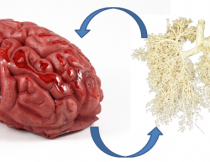Processing Autonomic Information Differently

Read other Conference Update items
by Wayne Pereanu
Your brain controls many bodily functions (such as breathing) without your conscience control using what is known as the autonomic system. Several recent studies have linked autonomic system activity with social and emotional abilities. Dovetailing with this, there have been some reports of autonomic abnormalities in ASD patients. These findings hint that the regions of a brain responsible for processing autonomic information may play a role in the emotional and social deficits of ASD.
Tehila Eilam-Stock presented unpublished research at a poster session on Sunday describing specific brain areas from ASD patients that were processing autonomic information differently. To do this, they measured the electrical conductance of skin while individuals were lying still. Small and continuous changes in conductance of the skin has been shown to directly relate to the amount of processing of autonomic information the brain is performing. The work presented found that the frontal cortex in ASD patients was not being engaged as much as control patients. Whereas the occipital cortex was being used to a greater extent for autonomic processing in ASD patients.
The results of the study provide evidence that autonomic information is processed different by ASD patient brains. They specifically identified regions that either showed increased or decreased activity in relation to autonomic processing when compared to controls. This work is a step towards describing the role the autonomic system may have on the core symptoms exhibited in ASD.

